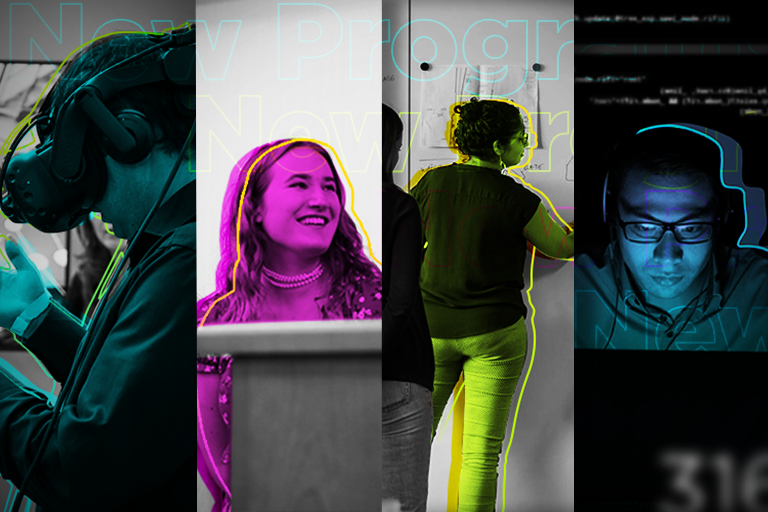New Programs Prepare Students to Lead the Challenging Work Ahead
As the world tries to solve problems in a global pandemic, MSU is launching new degree programs to prepare communication professionals for the challenging work ahead. MSU’s College of Communication Arts and Sciences invites undergraduate students to enroll in four new programs this fall, including public relations, information science, communication leadership and strategy, and games and interactive media.
The harmful coronavirus that spread the COVID-19 disease to millions around the world has proven there’s a dire need for innovative technology solutions and essential communication, to protect the public from illness, communicate with customers, provide work-from-home alternatives, and mitigate the impacts on people, communities and organizations.
“The lessons we have learned during the COVID-19 pandemic show that there are not nearly enough experts in human-computer interaction to facilitate a smooth transition to a labor force required to work remotely,” said Mike Stern, Chair of the Department of Media and Information.
Graduates of these new programs can expect to be in demand as business adapts to new challenges in the years to come. The four new programs will prepare highly motivated students to lead the way in the communication of now.
Communication Program Ranks fourth In the World
“I am excited about our new majors that build on our current strengths in communication, public relations, game design and human-centered design,” said Dean Prabu David. “These majors were designed with great care by our faculty with input from employers, alumni and students. They will help our students navigate the challenges of a complex world of communication to become effective, ethical and transformative communicators.”
Students interested in pursuing one of the new destination majors at the College of Communication Arts and Sciences are encouraged to contact an advisor. Each new major applies to a Bachelor of Arts degree, and more information is available online:
- B.A. in Public Relations
- B.A. in Games and Interactive Media
- B.A. in Information Science
- B.A. in Communication Leadership and Strategy
Public Relations
The Public Relations major will provide students with a comprehensive and current set of skills that will prepare them to lead mass communication for corporations, nonprofit organizations, and social causes. Responding to the extraordinary growth of social media, the program will cover the theory and application of storytelling, empowering students to enhance content creation on established and emerging platforms. These include traditional information outlets, digital platforms, and social media.
“The new major in Public Relations will give Spartans an enhanced opportunity to prepare for exciting careers in the growing field of PR,” said Andrew Corner, professor of practice and associate chair of the Department of Advertising and Public Relations. “The program builds on MSU’s many decades of excellence in academic and practical training. Graduates will be prepared for success as communication strategists and specialists at all levels in industry, government and nonprofit organizations.”
The major will cover the theories of public relations, persuasion, social media interaction, and mass communication, as these apply to public relations, audience analysis, and application of social media strategies.
Games and Interactive Media
The Games and Interactive Media major will provide a depth of knowledge and a uniform core, with foundational teaching in several areas related to games and interactivity, an area where MSU already leads.
"We are very excited about the launch of the new Games and Interactive Media Major! This new major expands on our top-rated game program, propelling us to the next level of game design and development education, providing both breadth and depth to better prepare our graduates for the rapidly expanding game industry,” said Professor Brian Winn, director of the Games for Entertainment and Learning (GEL) Lab and associate chair of the Department of Media and Information.
Coursework will cover fundamentals in the art and design of games, programming for digital games, and other areas of game development. It will also cover the business, the history, and the social impacts of games.
Students will gain valuable skills in communicating and collaborating on team-based projects, while building a strong portfolio. The college partners with game studios to offer project-based learning and to provide an authentic, real-world experience in the program. MSU students who study gaming produce high-quality content and work for some of the largest and most respected game companies in the world, including EA, Activision, Ubisoft, Rockstar, Blizzard, Bungie, Insomniac, and more.
Information Science
The Information Science major will bring together perspectives from engineering and computer science, along with those from management and the social sciences. This degree will not only offer training in coding, but it will also offer a deep understanding of the user experience (UX) and how technologies shape the world.
“Information Scientists lead the way with knowledge and skills for public, private, not for profit, and educational businesses and entities to stay nimble and equipped to deal with life in the 21st century. Our Information Science majors study a wide range of topics and build expertise in addressing the relationship between information, technology, and people all in areas such as science, business, education, and culture,” said Mike Stern, Chair of the Department of Media and Information.
The major will produce interdisciplinary and in-demand professionals who are experts in human-centered design and information management. Students will have a choice of following one of three paths. These three paths include the design of human-centered technologies, media and information management, or information and society.
Graduates will be equipped for jobs emerging from the growing information, technology and knowledge economy with the skillset to design and create new interactive technologies, manage organizations that use information technologies, and create policies that govern the use of technologies in organizations and society, all while understanding and addressing the relationship between technology and society.
Communication Leadership and Strategy
The Communication Leadership and Strategy major will provide students with a foundational base of knowledge and abilities that go far beyond tactical communication tasks and responsibilities. The program of study will equip students with the skills necessary to conduct rapid evaluations of the issues and communication challenges faced by corporations and nonprofit organizations.
"The Communication Leadership and Strategy degree will produce graduates with the ability to assess organizational communication needs, develop effective strategies, and lead large-scale communication efforts,” said Professor of Practice Shawn Turner, who will run the program. "The degree is focused on helping students develop the practical skills necessary to design and lead strategies that are effective in responding to the kinds of communication challenges organizations face every day."
The major will train students to analyze the demographics of target audiences, craft messages that are rooted in communication theory, and assess the effectiveness of strategic communication efforts. More importantly, the program will give students the ability to develop, execute, and evaluate long-range communication strategy for the organizations and/or businesses they serve and the causes they support.
"We know that in order to be highly effective communication practitioners, graduates need to have a core set of applied skills and a solid foundational understanding of communication research and theory,” said Turner. “That's exactly what this degree offers."
These skills will prepare graduates to excel in advanced roles in communication and to respond to the needs of a broad range of employers that are seeking visionary leadership in strategic communication.
By Melissa Priebe




